Unveiling the Secret Sauce of Israel’s Start-Up Nation Success
Guest Post By: Xuqi Chen, a Foster Evening MBA Candidate. She is a Global Business Center Study Abroad Scholarship Recipient, and she studied abroad through a Study Tour to Israel and the West Bank, during Winter Quarter 2023.
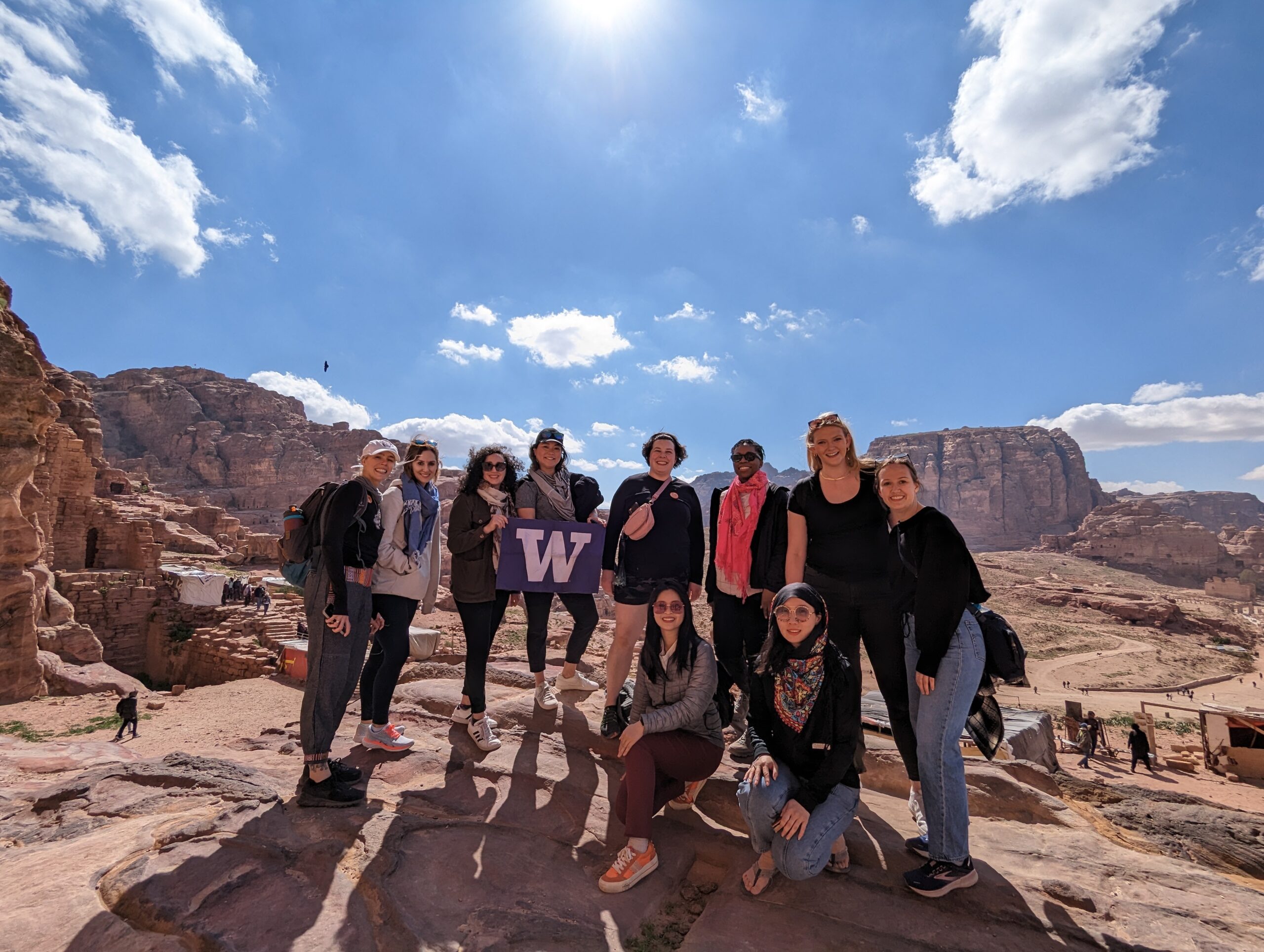
Foster MBA students in Petra, Jordan
Visiting Israel has always been on my bucket list, not only for its distinct fusion of culture, religion, and historical significance but also for its emerging prowess in technology startups. The overseas learning journey to Israel and the West Bank, arranged by the UW Foster Global Business Center, stands as a monumental episode in my Foster MBA journey. The academic expedition during the Spring term of 2023 was spearheaded by a formidable triad—UW Professor Tracey Seslen, known for her expansive network; GBC Program Director Angela Shelley, a mastermind of logistics with an engaging personality; and our knowledgeable guide Amitai Fain, who also happens to be a bar owner with an excellent collection of Israeli music. This voyage not only offered me the opportunity to establish enduring friendships with students from both the Evening and Full-time MBA programs but, more importantly, provided me with a deeper insight into the foundations of Israel’s thriving startup ecosystem.
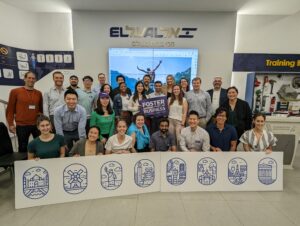
Company meeting at EL AL Airline
Our ten-day journey incorporated both culturally enriching sights and insightful corporate engagements. As Foster students, we were granted an exclusive entry into businesses that would usually remain beyond our reach. Our first company visit was to El AI Airlines, where a senior executive enlightened us about the airline’s history, strategic positioning, and the unique challenges it encounters while trying to operate regular flights whilst respecting Shabbat and religious holidays at its primary base, Ben Gurion airport. Under the security and logistics guidance of Crownox, the very firm that ensured Rihanna’s safety during her visit to the Middle East, we were granted access to two Palestinian companies – Rawabi and Birzeit Pharmaceutical Company. Venturing further to the kibbutz Beit HaEmek in northern Israel, we met Saar Safra, a proud Foster MBA graduate and the Chief Bee Officer at Beewise. He gave us a demonstration of a solar-powered robotic beehive which aids beekeepers in pollination and honey production, thereby contributing to the preservation of bee populations. We were then received by another UW Foster MBA Alum Moshe Zilberstein, who offered us a sneak peek into Israel’s vibrant venture capital scene and technological startups, including Next47, Homez, and Zesty.
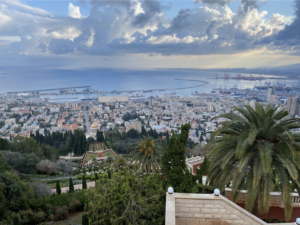
Haifa Garden and Port of Haifa
Our cultural exploration had us traverse the majestic Haifa Garden, the ancient relics of Akko’s templars castle, and the historic Masada Fortress. Post our buoyant sojourn on the Dead Sea, we embarked on a day trip to Eilat and Petra, Jordan. An old Talmud adage declares that when beauty was distributed in the world, nine out of ten measures were seized by Jerusalem, with the rest of the world sharing the final measure. True to this saying, Jerusalem, a city with roots in antiquity, astounded us with its vibrant modernity. Our itinerary included touring the city’s old quarters and a visit to the bustling Yehudah market. The gastronomic delights of Israel were nothing short of incredible. We indulged in an array of local specialties including Medjool dates, Jaffa oranges, succulent shawarma, creamy hummus, and fluffy pita. As we rested in a hookah stall at the Muslim market in the old town of Jerusalem, we found ourselves enveloped in the unique sensory experience – the lively haggling voices of the marketplace, the intoxicating scents of frankincense, myrrh, and exotic spices, and the mesmerizing sight of the resplendent golden dome. In those moments, we lived as the locals of Jerusalem’s old town did, sharing in the simple joys and happiness of daily life, a profound moment of serenity that transcended cultural borders.
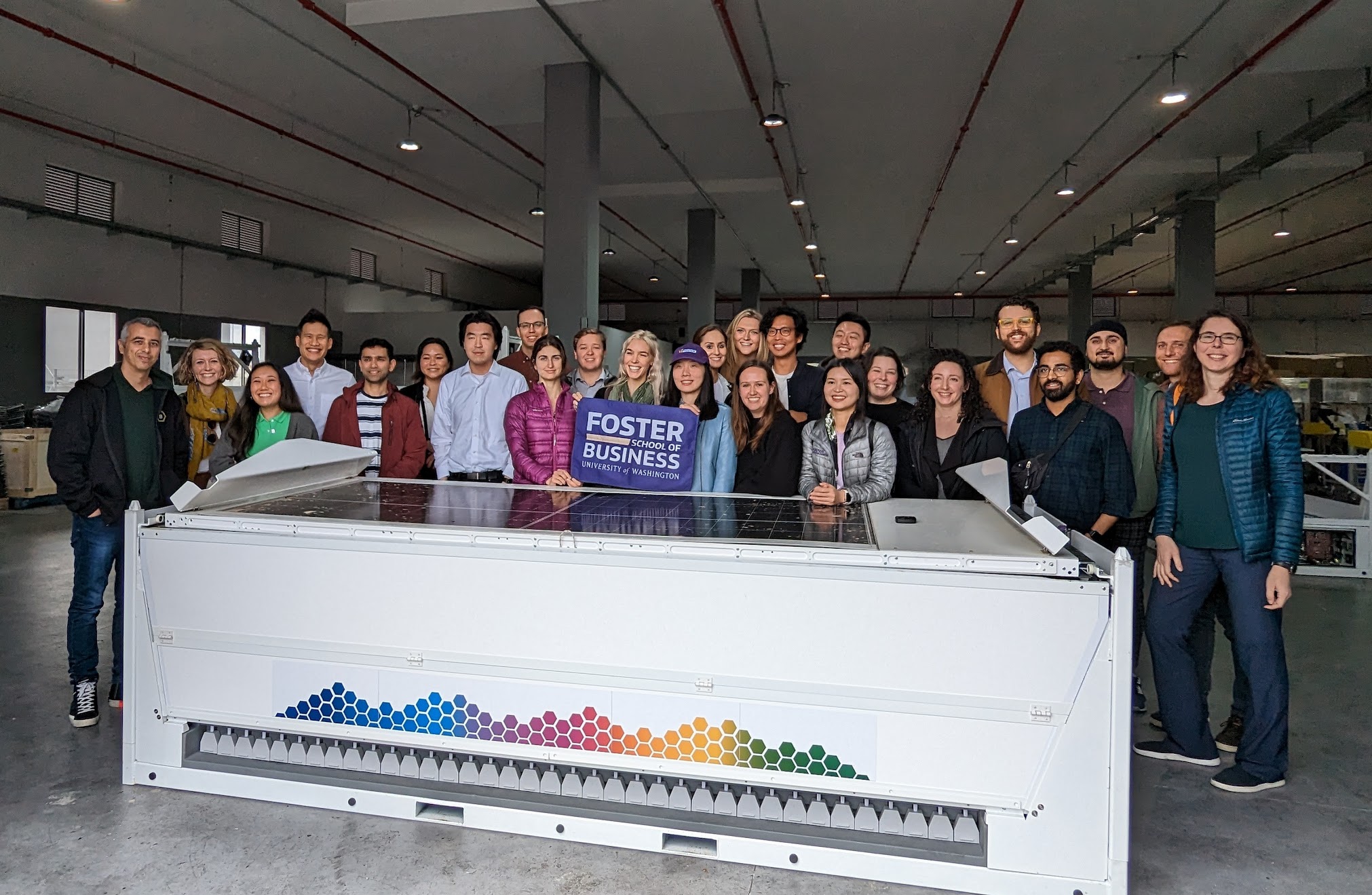
Company meeting at Beewise
The climax of study abroad experience lay in the chance to engage with locals from both Israeli and Palestinian backgrounds, representing a diverse range of industries including aviation, port supply chain logistics, whiskey production, military security systems, robotics, real estate, pharmaceuticals, security, venture capital, and agriculture. Hearing their stories and gaining their unique insights was incredibly enriching. Here are the three key insights I have about the catalysts behind Israel’s emergence as a Startup Nation.
-
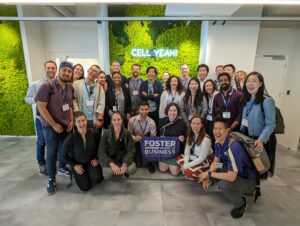
Company meeting at AlephFarms
The unique geopolitical environment is an important external driving force for Israel becoming an innovative nation. The complex relationship between Israel and its Arab neighbors can be summed up with one key word: “conflict.” Since its establishment in 1948, Israel has had to survive in a hostile environment and effectively counter the threat of modern terrorism. To achieve this, Israel has relied on continuous technological innovation and upgrading to develop its national economy, strengthen its defense and security, and enhance its international standing. Israel’s key innovation sources include: compulsory education and the research foundations of universities, mandatory military service, valuable experiences from previous entrepreneurs and Sayeret Matkal, government policy support, the defense concept of Ben-Gurion, the perspective of risk brought by being a small economy and an immigrant nation, informality (hutzpah), and dense social networks.
-
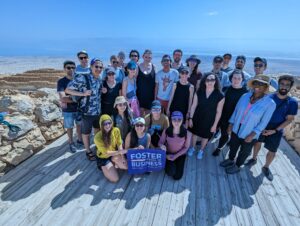
Foster MBA students at Masada Fortress
Israel’s technological innovation is problem-oriented innovation with a propensity for swiftly initiating projects. The prevalent ethos in Israel’s tech startup culture leans more towards “build to sell” rather than “build to last”. The uncertainty regarding Israel’s future nurtures a unique mentality of “living in the moment”. In this landscape, most entrepreneurial ventures are not designed to scale significantly. The primary aspiration for many entrepreneurs is to sell their project to a larger firm before launching into another entrepreneurial pursuit. It’s uncommon for individuals to strive for expansive, long-term projects. After all, Israel doesn’t possess a market of the same magnitude as China or the United States. And while there’s an effervescent startup culture, the country’s volatility often discourages many from dedicating their entire career to one company.
-
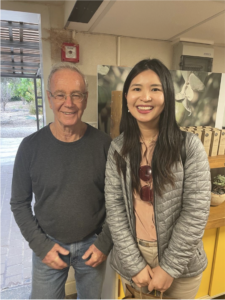
Xuqi Chen and host from Kibbutz Hatzerim
Given the limited availability of essential resources, Israel is compelled to optimize the abilities of each individual and make the most out of every available resource. The people of Israel possess a profound affection for their nation and a strong sense of pride in their cultural identity, resulting in an extraordinary sense of unity among them. A notable illustration of this is Netafim, an irrigation equipment company, established in 1965 in Kibbutz Hatzerim. In 1946, a group of young individuals settled on a barren hill in the Negev desert. There was nothing there – no regular water supply and soil salinity rendered agriculture nearly impossible. By 1959, they were on the verge of relocating, but a collective decision at a members’ meeting prompted them to persist and the rest is history. The experience at Kibbutz Hatzerim and the founding of Netafim taught us an important lesson: to dare the impossible, achieve more with less, and foster innovation by interconnecting diverse sectors such as military technology, agriculture, and artificial intelligence.
As I boarded the plane back to Seattle, I felt both physically exhausted and emotionally fulfilled. Traveling to Israel on my own was something I never would have done, and the opportunity to visit the places we did as part of the UW program was truly remarkable. There’s an old saying that goes, “It is better to travel ten thousand miles than to read ten thousand books.” Studying abroad provides the best way to fully immerse yourself in a new country, experience a different way of life, and forge lifelong friendships. If you’re unsure about participating in a study tour or a similar program, I urge you to do everything you can to make it happen. It’s an experience you’ll treasure for the rest of your life.
Xuqi Chen, a native of Guangzhou, China, is currently employed as a Data Engineer at Amazon. With a bachelor’s degree in electrical engineering from UCLA, Xuqi has spent four years at Deloitte Consulting, where she contributed to analytics transformation solutions for Fortune 500 clients in the fin-tech and retail sectors. Xuqi embarked on her journey with the Foster Evening MBA program in the Fall of 2020, balancing her full-time role at Amazon with her evening classes. Post MBA graduation, Xuqi aspires to leverage her unique blend of tech/Foster MBA experience and her cultural ties to both China and the US to carve out a leadership role in the tech/fin-tech realm. Outside of work and school, Xuqi loves brewing tea with friends, exploring local hiking trails, and delving into alternative investments to discover potential alpha. She is a Global Business Center Study Abroad Scholarship Recipient.
